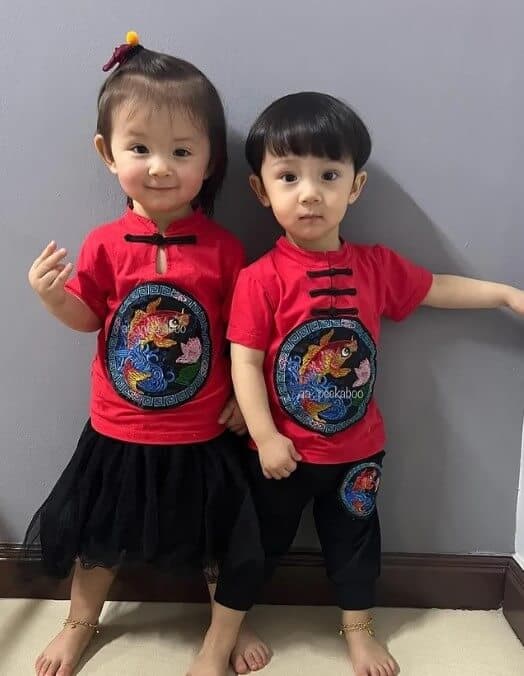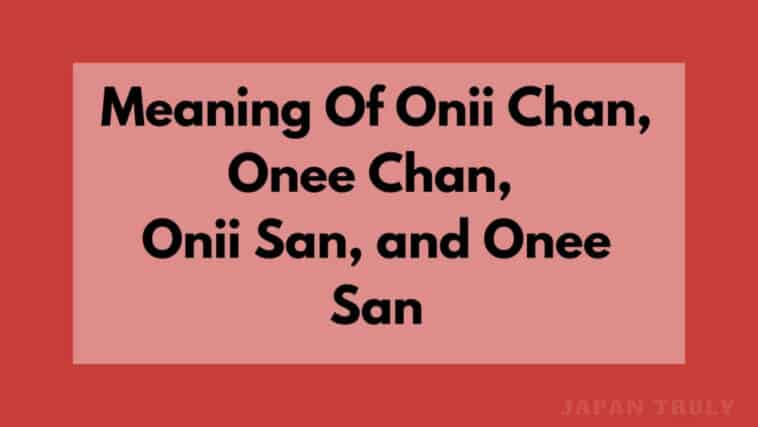Want to know the meaning of Onii Chan, Onee Chan, Onii San, and Onee San? Well, don’t worry, check out the meaning of the words down below!
Ever wonder what “onii-chan” means? Explore the world of Japanese honorifics! We break down “onii-chan,” “onee-chan,” “onii-san,” and “onee-san,” revealing the subtle differences between these terms used for older siblings and the emotions they convey.
Page Contents
Meaning of Onii Chan, Onee Chan, Onii San, and Onee San
- Meaning of Onii Chan (お兄ちゃん): Older Brother
- Meaning of Onii San (お兄さん): Older Brother
- Meaning of Onee chan (お姉ちゃん): Older Sister
- Meaning of Onee San (姉さん): Older Sister
What’s The Meaning of Onii Chan?
Let’s begin with the meanings of the first two words, Onii Chan and Onee San. Onii is a Japanese word that has two kanji letters (お兄).
These kanji letters literally mean “elder brother” or “big brother”. The word “Chan” is also of Japanese origin, however, it’s just an honorary title that’s used to address a close relative like a brother, sister, a little child, etc.

Onii Chan is basically an informal Japanese word that can be used by younger siblings to refer to their older brother. And sometimes, it’s just not biological younger siblings who can use the term “Onii Chan”.
The term can be used by anyone referring to an older brother figure and we’ll learn more about this as we go further.
What’s The Meaning of Onee Chan?
Meanwhile, Onee is also a Japanese word that has two kanji letters (お姉) which mean “elder sister” or “big sister”. Similar to Onii Chan, the word Chan here is used with Onee as an honorary title to refer to a close relative and in this case the elder sister.
Onee Chan is also an informal Japanese term that’s used to address someone’s older sister. Just like the word Onii Chan, Onee Chan also has a few variations hence the conditions of using the word to refer to an older female can differ.
What’s The Meaning of Onii San?
Initially, the word onii san and onee san were thought to have different meanings from onii chan and onee chan.
However, both words have the same meanings except the suffixes and honorary titles were altered. This probably sounds confusing, hence we’ve analyzed the differences simply for you below.
The Japanese words Onii Chan and Onii San have the same meaning which is “older brother”. However, the only difference here is the suffixes used after the words.
Chan is an honorary title and suffix that’s used mostly in informal contexts like referring to a close relative while San is a popular honorary title and suffix that’s mainly used for formal occasions such as talking to strangers or anyone of a higher rank.

What’s The Meaning of Onee San?
Similarly, Onee Chan and Onee San also mean elder sister but the suffixes and honorary titles can be altered depending on how a person is related to you.
For instance, you can use Onee Chan if you’re addressing your biological elder sister and use Onee San when referring to an older female who you consider a sister figure who may or may not be a relative.
As we said, there are a set of conditions as to how these words can be used depending on the context, therefore it’s best we learn them before using these words.
- Related: What is the meaning of Kanpai
How To Use Onii Chan, Onee Chan, Onii San, and Onee San?
The intricacies of the Japanese language are real and unlike English, Japanese words can have alternative meanings depending on the contexts they’re used in.
Therefore, it’s best we learn the fundamental concepts of words like Onii Chan, Onee Chan, Onii San, and Onee San and how they should be used.

- How to use Onii Chan
Onii Chan is the informal term that’s used to refer to an older brother in the Japanese language. It can be used by a younger biological sibling to address their elder brother.
The word Onii Chan can also be used by younger cousins to address an elder cousin/cousins in their family. Apart from family members, Onii Chan can also be used to address an elderly male close to you who appears to be a brotherly figure for example a senior in high school. Keep in mind that Onii Chan should only be used by a younger person to refer to an older male.
- How to use Onee Chan
Onee Chan is the informal term in Japanese for older sister. It’s mostly used by younger biological siblings to address their elder sister. It can also be used by any younger member in the family to refer to an elder female if the female has a sisterly relationship with them.
Besides family relationships, the word Onee Chan can also be used to refer to an elder female at school, workplace, team, etc if they have a close relationship with you. Make sure to use Onee Chan only for an elder female.
- How to use Onii San
Onii San is the formal Japanese term used to refer to an elder brother. It can be used by younger siblings to address their elder brother and even by younger cousins to refer to their elder male cousin.
Since Onii San is a formal word for elder brother, it can be used on formal occasions. You can also use Onii San to address someone whom you consider your older brother even if they aren’t related to you. The term should only be used to refer to an older male.
- How to use Onee San
Onee San is the formal version of Onee Chan which is a Japanese term to refer to an elder sister. It should be used in formal contexts, especially when referring to an elder female in public places or on formal occasions.
Onee San can even be used by nonrelatives who have a close relationship with an elder female whom they look up to as an older sister such as a senior female at high school or at the workplace.
When And When Not To Use Onii Chan, Onee Chan, Onii San, and Onee San
The Japanese people are very organized and well-mannered hence they have a set of criteria that they sincerely follow when speaking to people, especially elders.
Since Onii Chan, Onee Chan, Onii San, and Onee San are words that are used to refer to elder siblings, there are certain rules we must follow before addressing someone with those words.
Therefore, let’s take a look at the ideal circumstances when these words can be used.
- When Speaking To Family Members
As we mentioned above, Japanese traditions allow younger siblings to use Onii Chan, Onee Chan, Onii San, and Onee San to their older siblings. These words can also be used by distant relatives to address an elderly male or female whom they look up to as a sibling. However, if you want to express respect towards an elder sibling it’s best to use the formal words Onii San and Onee San.
- When Speaking With Close Friends
You can use these words when speaking with close friends but make sure your close friends are older than you and not younger. Otherwise, the usage of those words would be meaningless.
You can use the informal words Onii Chan and Onee Chan when speaking with friends or even opt for the formal versions.
- With Strangers
Don’t use these terms to address a stranger despite them being older than you. This is because Onii Chan and Onee Chan are words that not just depict the respect you have towards a sibling but also the intimacy and love as well.
Hence, it’d be awkward to refer to a stranger using the words Onii Chan and Onee Chan.
Alternative Words for Onii Chan, Onee Chan, Onii San, and Onee San
There are a few other words in the Japanese language that can be used to refer to your older siblings and, they’re quite similar to the words Onii Chan and Onee Chan.
| Alternative Words for Onii Chan, Onee Chan, Onii San, and Onee San | English Pronunciation | Used For |
| お兄さま | Onii Sama | Elder brother |
| お姉さま | Onee Sama | Elder sister |
| 兄貴 | Aniki | Elder brother |
| 姉貴 | Aneki | Elder sister |
| 兄 | Ani | Elder brother |
| 姉 | Ane | Elder sister |
What does Onee San mean?
Onee San is the Japanese word that’s used to address an elder sister. It’s the formal version of the word Onee Chan which also means elder sister. However, Onee San is used in formal contexts and it depicts the respect a younger sibling has towards their elder sister.
Is it Onee Chan or San?
The words Onee Chan and Onee San have the same meaning which is the elder sister. The suffixes chan and san are used after the word “Onee” although they don’t alter the meaning of the word, they’re used in different contexts. Onee Chan is an informal term for elder sister which is mostly used to show the love and intimacy a younger sibling has towards the elder sister while Onee San is used on formal occasions as a means of showing respect to the elder sister.
Does Onee San mean sister?
Onee San is the Japanese term that means elder sister and it’s mostly used on formal occasions, unlike Onee Chan which is an informal term for elder sister. By using the word Onee san, the younger sibling expresses their utmost respect for their elder sister.
What’s the difference between ONII-SAN and ONII Chan?
The terms Onii-chan and Onii-san are both Japanese words that mean “older brother.” However, there are some subtle differences in how they are used.
- Onii-chan is a more informal and affectionate term, often used by younger sisters or female friends to address their older brother. It can also be used in a playful or teasing way.
- Onii-san is a more formal and respectful term, often used by older sisters or male friends to address their older brother. It can also be used by strangers or acquaintances to address an older man.
In general, Onii-chan is used when the speaker is close to the older brother and wants to express affection or familiarity. Onii-san is used when the speaker wants to show respect or distance.
Here are some examples of how the two terms might be used:
- A young girl might call her older brother Onii-chan when she wants to get his attention or ask him for a favor.
- A teenage girl might call her older brother Onii-chan when she is teasing him or trying to get him to do something for her.
- A young man might call his older brother Onii-san when he is talking to him about serious matters or when he wants to show respect.
- A stranger might call an older man Onii-san when they are asking for directions or when they want to show respect.
Ultimately, the choice of whether to use Onii-chan or Onii-san depends on the relationship between the speaker and the older brother, as well as the context in which the word is being used.
What does Oni Chan mean for a girl?
The Japanese word onii-chan (お兄ちゃん) literally means “big brother.” It is a term of endearment used by younger sisters or female friends to address their older brother. The “-chan” suffix is used to show familiarity and affection.
When a girl calls her older brother onii-chan, it is a way of expressing her love and respect for him. It can also be used in a playful or teasing way.
In some cases, the term onii-chan can be used in a more sexual or suggestive way. This is especially true in the context of anime and manga, where it is sometimes used by female characters to refer to attractive male characters. However, this is not the most common way that the word is used.
In general, onii-chan is a harmless and affectionate term that is used by girls to address their older brothers. It is a way of showing their love, respect, and sometimes even playful teasing.
What does Onee San mean in Japanese?
The Japanese word oneesan (お姉さん) literally means “older sister.” It is a term of address used by younger siblings, friends, or acquaintances to refer to an older sister. The “-san” suffix is used to show respect.
Oneesan is a very common word in Japanese, and it is used in a variety of contexts. It can be used in a formal or informal setting, and it can be used to express a range of emotions, from affection to respect to distance.
Also Read





